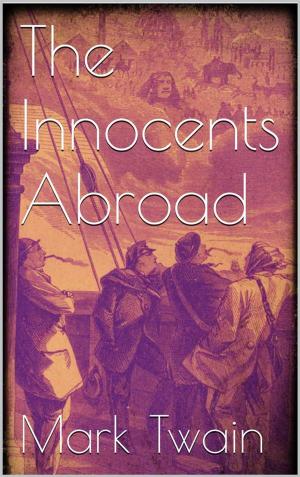THE INNOCENTS ABROAD Classic Novels: New Illustrated [Free Audiobook Links]
Fiction & Literature, Classics, Literary| Author: | Mark Twain | ISBN: | 1230000107230 |
| Publisher: | Mark Twain | Publication: | February 15, 2013 |
| Imprint: | Language: | English |
| Author: | Mark Twain |
| ISBN: | 1230000107230 |
| Publisher: | Mark Twain |
| Publication: | February 15, 2013 |
| Imprint: | |
| Language: | English |
"THE INNOCENTS ABROAD - Top Classic Novels" This edition included NEW illustrations + Free AudioBook Links + Clickable Table of Contents for both the list of included books and their respective chapters. Navigation couldn't be easier.
The text and chapters are perfectly set up to match the layout and feel of a physical copy, rather than being haphazardly thrown together for a quick release.
The Innocents Abroad, or The New Pilgrims' Progress is a travel book by American author Mark Twain published in 1869 which humorously chronicles what Twain called his "Great Pleasure Excursion" on board the chartered vessel Quaker City (formerly USS Quaker City) through Europe and the Holy Land with a group of American travelers in 1867. It was the best selling of Twain's works during his lifetime and one of the best selling travel books of all time.
Samuel Langhorne Clemens (November 30, 1835 – April 21, 1910), better known by his pen name Mark Twain, was an American author and humorist. He is most noted for his novel The Adventures of Tom Sawyer (1876) and its sequel, Adventures of Huckleberry Finn (1885), the latter often called "the Great American Novel."
Twain grew up in Hannibal, Missouri, which would later provide the setting for Huckleberry Finn and Tom Sawyer. He apprenticed with a printer. He also worked as a typesetter and contributed articles to his older brother Orion's newspaper. After toiling as a printer in various cities, he became a master riverboat pilot on the Mississippi River before heading west to join Orion. He was a failure at gold mining, so he next turned to journalism. While a reporter, he wrote a humorous story, "The Celebrated Jumping Frog of Calaveras County," which became very popular and brought nationwide attention. His travelogues were also well received. Twain had found his calling.
He achieved great success as a writer and public speaker. His wit and satire earned praise from critics and peers, and he was a friend to presidents, artists, industrialists, and European royalty.
Though Twain earned a great deal of money from his writings and lectures, he invested in ventures that lost a great deal of money, notably the Paige Compositor, which failed because of its complexity and imprecision. In the wake of these financial setbacks he filed for protection from his creditors via a bankruptcy filing, and with the help of Henry Huttleston Rogers eventually overcame his financial troubles. Twain chose to pay all his pre-bankruptcy creditors in full, though he had no responsibility to do this under the law.
Twain was born during a visit by Halley's Comet, and he predicted that he would "go out with it," too. He died the day following the comet's subsequent return. He was lauded as the "greatest American humorist of his age," and William Faulkner called Twain "the father of American literature."
"THE INNOCENTS ABROAD - Top Classic Novels" This edition included NEW illustrations + Free AudioBook Links + Clickable Table of Contents for both the list of included books and their respective chapters. Navigation couldn't be easier.
The text and chapters are perfectly set up to match the layout and feel of a physical copy, rather than being haphazardly thrown together for a quick release.
The Innocents Abroad, or The New Pilgrims' Progress is a travel book by American author Mark Twain published in 1869 which humorously chronicles what Twain called his "Great Pleasure Excursion" on board the chartered vessel Quaker City (formerly USS Quaker City) through Europe and the Holy Land with a group of American travelers in 1867. It was the best selling of Twain's works during his lifetime and one of the best selling travel books of all time.
Samuel Langhorne Clemens (November 30, 1835 – April 21, 1910), better known by his pen name Mark Twain, was an American author and humorist. He is most noted for his novel The Adventures of Tom Sawyer (1876) and its sequel, Adventures of Huckleberry Finn (1885), the latter often called "the Great American Novel."
Twain grew up in Hannibal, Missouri, which would later provide the setting for Huckleberry Finn and Tom Sawyer. He apprenticed with a printer. He also worked as a typesetter and contributed articles to his older brother Orion's newspaper. After toiling as a printer in various cities, he became a master riverboat pilot on the Mississippi River before heading west to join Orion. He was a failure at gold mining, so he next turned to journalism. While a reporter, he wrote a humorous story, "The Celebrated Jumping Frog of Calaveras County," which became very popular and brought nationwide attention. His travelogues were also well received. Twain had found his calling.
He achieved great success as a writer and public speaker. His wit and satire earned praise from critics and peers, and he was a friend to presidents, artists, industrialists, and European royalty.
Though Twain earned a great deal of money from his writings and lectures, he invested in ventures that lost a great deal of money, notably the Paige Compositor, which failed because of its complexity and imprecision. In the wake of these financial setbacks he filed for protection from his creditors via a bankruptcy filing, and with the help of Henry Huttleston Rogers eventually overcame his financial troubles. Twain chose to pay all his pre-bankruptcy creditors in full, though he had no responsibility to do this under the law.
Twain was born during a visit by Halley's Comet, and he predicted that he would "go out with it," too. He died the day following the comet's subsequent return. He was lauded as the "greatest American humorist of his age," and William Faulkner called Twain "the father of American literature."
![Cover of the book THE INNOCENTS ABROAD Classic Novels: New Illustrated [Free Audiobook Links] by Mark Twain, Mark Twain](https://www.kuoky.com/images/2013/february/500x500/1230000107230-eXOd_500x.jpg)



![Cover of the book THE STOLEN WHITE ELEPHANT Classic Novels: New Illustrated [Free Audio Links] by Mark Twain](https://www.kuoky.com/images/2013/january/300x300/1230000103025-nm3u_300x.jpg)







![Cover of the book THE ADVENTURES OF TOM SAWYER Classic Novels: New Illustrated [Free Audiobook Links] by Mark Twain](https://www.kuoky.com/images/2013/january/300x300/1230000100408-pF2k_300x.jpg)


